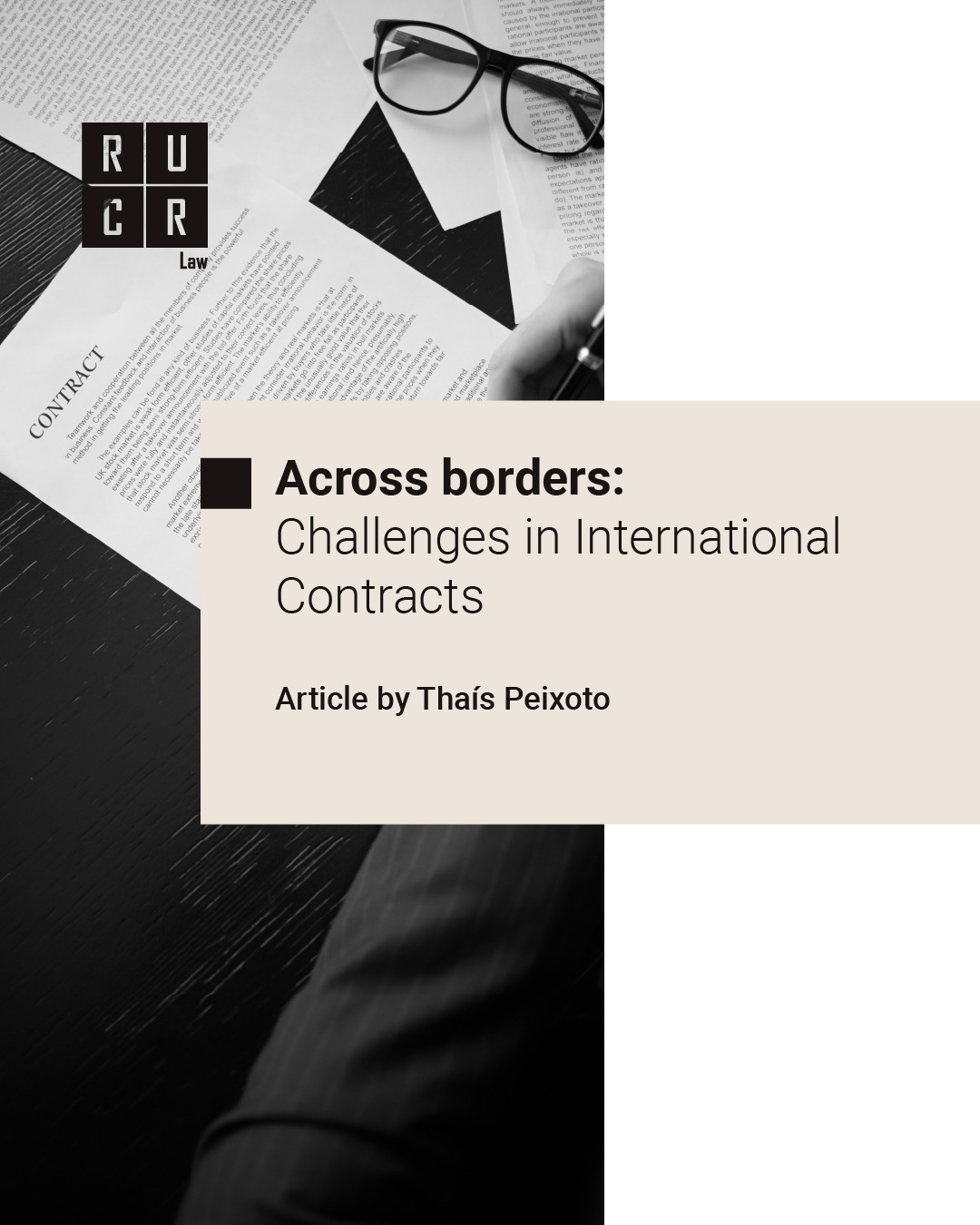
Between Frontiers: Challenges in International Contracts
Contracts consist of agreements between parties to create, modify, or extinguish rights and are based on a legal framework that guides their formation and effects.
These documents are fundamental in regulating relationships between parties and ensuring mutual agreement to comply with the established terms. Their purpose is to guarantee a transparent and lawful process, minimize risks, and provide a structure to resolve any disputes that may arise during the agreement’s execution.
International contracts are agreements entered into by parties located in different countries, involving contractual relationships subject to distinct legal systems.
The author Bruno Oppetit highlights that international contracts operate within a political and economic context and are highly sensitive to constant changes that generate conflicts and uncertainties.
Alongside these uncertainties, given that contracts must rely on a legal framework for their formation, questions arise when multiple legal systems come into play, such as when parties from different countries draft a contractual instrument.
The most significant issues regarding contracts in Private International Law involve determining the applicable legislation and the competent jurisdiction.
According to the author Paulo Nader, Private International Law “aims to determine, among the various legal systems of different countries, which should be applied to a specific situation, in addition to defining which jurisdiction is competent to solve the dispute” (NADER, 2007, p. 35).
From this perspective, one of the central aspects in seeking resolutions for such cases is identifying the “connecting factors” which may include the nationality of the parties, the place where the contract was executed, or the location where the obligations will have the most significant impact. These factors are crucial in determining which legal system will apply to a specific situation, ensuring stability and predictability in international legal relations.
Analyzing these connecting factors serves as criteria to link the relationship to a specific legal system, ensuring the application of the most appropriate norms to the case. The choice of these criteria is guided by legal doctrine and case law principles, aiming to provide predictability and justice to international legal relationships.
In Brazil, resolving conflicts of law in international contracts is governed by the Lei de Introdução às Normas do Direito Brasileiro (LINDB), which sets general rules for identifying the applicable legal framework. However, Brazilian jurisprudence and doctrine also emphasize the importance of party autonomy, allowing parties to select the applicable law and jurisdiction for the contract, provided that this choice does not conflict with public policy or good morals.
The principle of party autonomy, essential in Private International Law, grants parties the freedom to choose the legal framework and jurisdiction that best suits their interests. However, this freedom is conditioned on compatibility with fundamental values, avoiding conflicts with basic rights or legal certainty.
In summary, while parties have the autonomy to negotiate, this freedom cannot be exercised in a way that undermines fundamental rights or compromises legal certainty. This assertion, however, adds further complexity to this scenario.
Parties often come from diverse cultural, linguistic, and political backgrounds, have distinct economic experiences, and operate under different regulatory and tax systems, among other factors that contribute to the situation’s complexity.
The issue of the law applicable to the contract is not about seeking a specific legal system but rather about choosing among the various systems that could apply, selecting the one whose framework will best structure and limit the contract in question. Therefore, it is not about binding the contract to a legal system but choosing the system most suitable for governing its terms and, consequently, the one best suited to each client’s specific situation.
This is where the essential role of the international lawyer comes into play, mediating between parties during negotiations to create the contractual instrument effectively.
The lawyer assists in understanding how their client can best protect themselves in international matters, ensuring the contract’s validity.
The goal is to draft an international contract from the beginning, addressing the applicable laws and choice of jurisdiction to anticipate and minimize potential conflicts by defining in advance the governing legislation and the jurisdiction responsible for resolving disputes.
Thus, Private International Law goes beyond being a simple coordination mechanism between diverse legal systems. By applying appropriate norms, the international lawyer ensures that international relations unfold in an orderly and predictable manner, respecting both local laws and the expectations of the parties involved while providing legal certainty in international contracts.
References
D’ISEP, Clarissa Ferreira Macedo; COSTA, José Augusto Fontoura. Contrato internacional. In: ENCICLOPÉDIA JURÍDICA DA PUC-SP. Tomo Direito Internacional, Edição 1, fevereiro de 2022. Available at: https://enciclopediajuridica.pucsp.br/verbete/502/edicao-1/contrato-internacional. Accessed: Dec. 6, 2024.
FERRAZ JUNIOR, Tercio Sampaio. Introdução ao estudo do direito: técnica, decisão, dominação. São Paulo: Atlas, 2015, pp. 227-240.
OPPETIT, Bruno. L’adaptation des contrats internationaux aux changements des circonstances: La clause hardship. In: Journal du Droit International, n. 4, Paris, 1974, apud STRENGER, Irineu. Contratos internacionais do comércio. 4th ed. São Paulo: LTr, 2003, p. 32.
NADER, Paulo. Introdução ao Estudo do Direito. 38th ed. Rio de Janeiro: Forense, 2007.
PEREIRA, João. Artigo sobre contratos estrangeiros e os principais conflitos no âmbito do direito internacional privado: normas aplicáveis aos contratos internacionais privados. Jus.com.br, 2019. Available at: https://jus.com.br/artigos/110569/artigo-sobre-contratos-estrangeiros-e-os-principais-conflitos-no-ambito-do-direito-internacional-privado-normas-aplicaveis-aos-contratos-internacionais-privados#google_vignette. Accessed: Dec. 6, 2024.
STRENGER, Irineu. Contratos internacionais do comércio. 4th ed. São Paulo: LTr, 2003.
Latest Posts
The Strategic Relevance and Distinctive Nature of Labor Due Diligence in M&A Transactions
Labor Due Diligence constitutes a critical stage within the broader scope of legal and compliance assessments conducted in corporate Mergers and...
Built to Suit (BTS) Contract
The Built to Suit (BTS) contract is a commercial legal model in which the lessor commits to customizing a property — either by constructing it from scratch...
